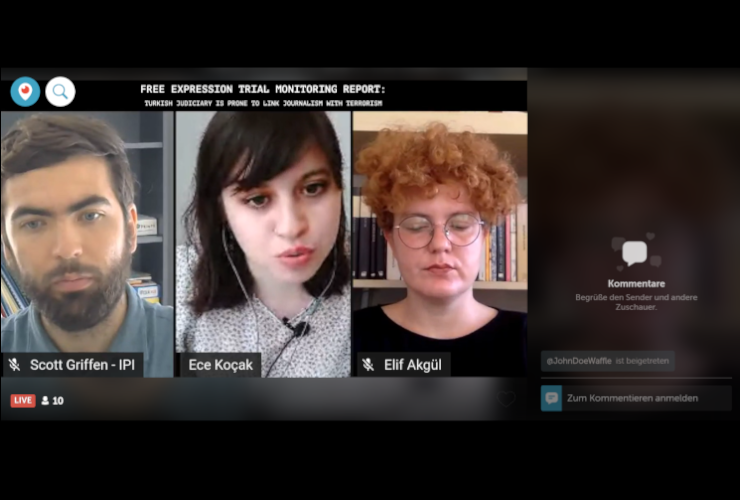On July 22, the International Press Institute (IPI) and the Turkey-based Media Law Studies Association (MLSA) held a joint panel on the Turkey Free Expression Trial Monitoring Final Report, which was published in March 2020 and highlights the results of IPI and MLSA’s year-long programme monitoring the trials of journalists and others prosecuted in Turkey for exercising their right to free expression.
MLSA Project Coordinator Ece Koçak, freelance journalist and trial monitor Elif Akgül and IPI Deputy Director Scott Griffen spoke at the panel, evaluating the findings and sharing their observations from the monitoring period.
The panel started with Griffen’s comprehensive evaluation of the report’s key findings, which covered 319 hearings of 169 freedom of expression cases followed in 15 provinces between February 2019 and March 2020.
‘’To analyse the scope of the injustices and rights violations during the trials, it was necessary to start this project,’’ Griffen said. He added that the project findings confirm that journalists’ work is being used as evidence to support charges of terrorism. ‘’The work of these journalists is not only being publicly smeared as acts of terrorism by officials but it is also being used in the courtroom as well.”
During this period, in 98 of 169 cases (about 60 percent), defendants were charged with terrorism charges, while 69 of 89 journalists (78 percent) who were convicted were tried under Turkey’s Anti-Terror Law. Another key finding in the report is that journalistic activities were used as evidence in 76 percent of these terror-related charges.
In addition to Koçak, who stated that Kurdish journalists and Kurdish media agencies were the most affected by the judicial harassment, journalist and trial monitor Akgül underlined how that Kurdish journalists are treated with greater lack of respect than others.
She also underscored the arbitrariness in decision-making by the judiciary. ‘’When you see a judge, you can almost predict the outcome. That makes all these trials very political’’, Akgül said.
According to the data in the report, there is a noticeable improvement in the attitude of judges towards the defendants. However, Koçak underlined the fact that although some improvements were recorded in the physical conditions of the courtroom during the monitoring period, it would not be right to say there is a clear improvement in the overall status of prosecution of journalists.
Griffen supported this conclusion by saying: ‘’We need to look back on violations which happened before, we cannot just say numbers got better.’’
The report itself highlights that any improvements “should not be mistaken for the re-emergence of an independent and objective judiciary acting free from influence of political leaders”, noting that “the judiciary has fallen further under the vertical power structure imposed by the president to ensure his interests are served.”



